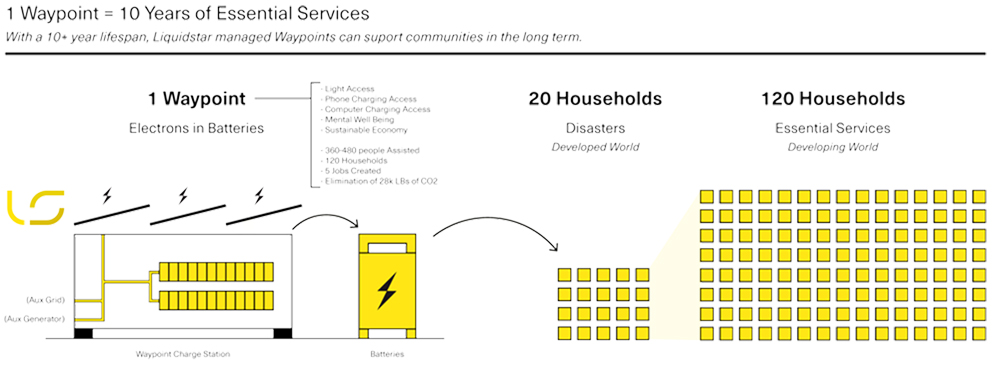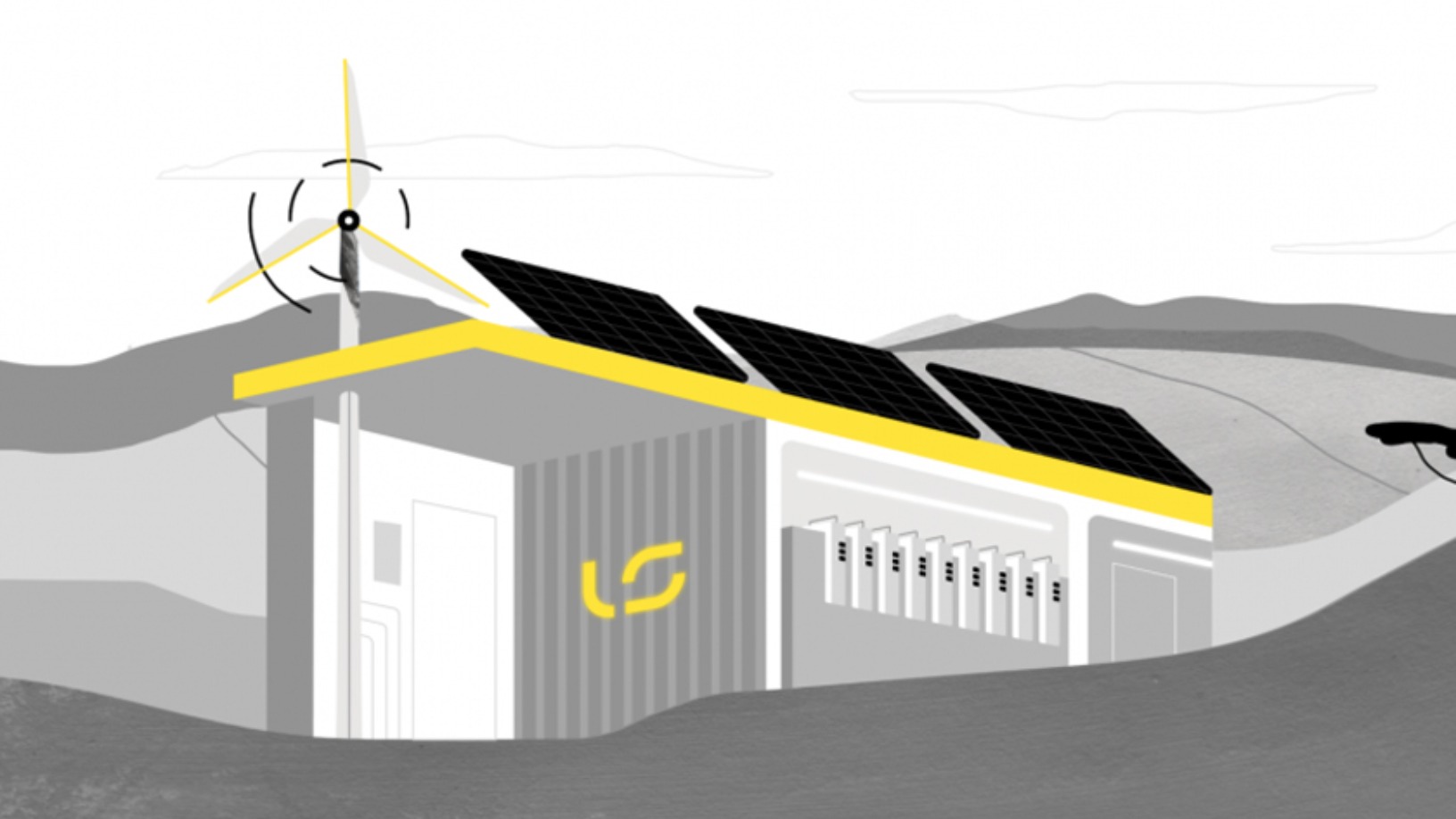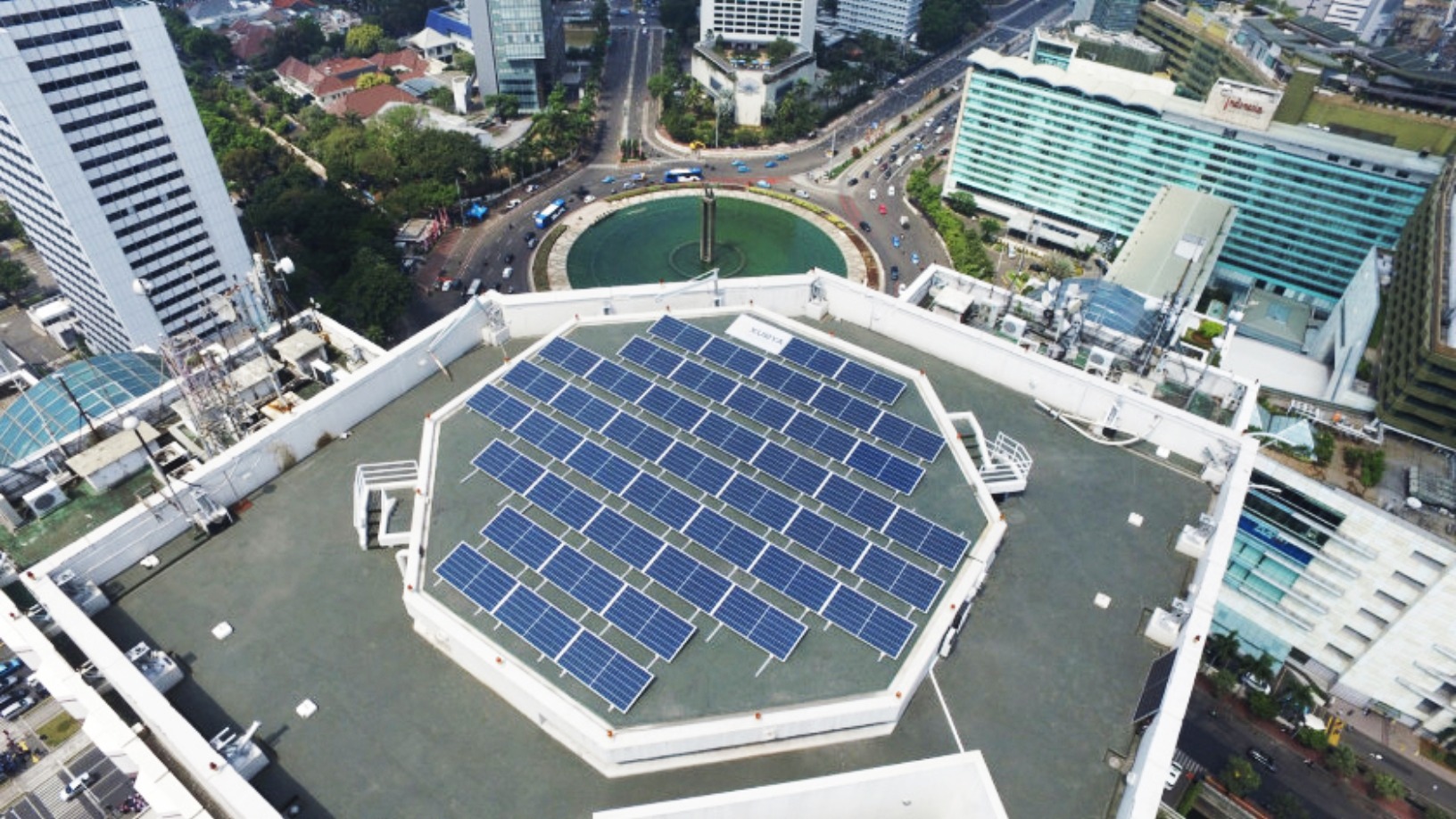Hong Kong-based Liquidstar has joined global efforts to bring affordable renewable energy to off-grid communities using batteries that are recharged and distributed at local hubs built from repurposed containers that are equipped with solar panels or small wind turbines. Called a Waypoint, each hub can power up to 120 off-grid households in developing countries.
Customers can rent Liquidstar’s batteries for a variety of uses – for lighting, to power household appliances, to charge phones or to even run farm equipment. A blockchain-based system stores customers data and manages the smart rental contracts. The batteries can also be deployed to support disaster recovery or to charge electric motorcycles.
According to Liquidstar co-founders Scott Salandy-Defour and Conor Colwell, the company’s vision is to create a “liquid” power storage that can be easily distributed and can accommodate different types of batteries. “We are designing our own batteries, but we are not betting on any specific technology,” Salandy-Defour told CompassList in an interview.
In a small pilot project in Nigeria last year, Liquidstar batteries were used to power various equipment, from radios to computers. “One computer science student said that the battery changed his life because he was able to continue working and studying late into the night,” Colwell said.
Incorporated in 2019, the company, which pitched at the Singapore Week of Innovation and TeCHnology (SWITCH) in late 2020, is planning to raise $2.5m to fund the manufacture of its own Waypoint containers and launch more pilot projects. “Every investment in Liquidstar is guaranteed to produce impact for 10 years,” Colwell said.
Liquidstar has already attracted interest from government agencies and NGOs. It has partnered with Indonesia’s Ministry of Villages and the United Nations Development Programme (UNDP) to develop pilot projects in Indonesia, Kenya and Lebanon, as well as a smart city project in Benin.
Decentralized power
Besides renewable energy sources, Liquidstar’s Waypoints can also be powered by diesel generators or micro-hydro power plants, making the system adaptable to different types of terrain or disaster relief situations. The Waypoints are run by “power rangers,” locally trained staff who help customers rent the batteries, coordinate payments and handle battery pick-ups and deliveries.
The identities of all registered users are stored in the blockchain and every battery that is rented out is linked to the user’s electronic ID. The smart contract system allows a battery to be unlocked for use only by a verified, paying customer. The battery would stop discharging if it is reported stolen or the customer’s rental period has run out.
The smart contract and battery locking system are crucial to Liquidstar’s automated operations. “When you rent a battery, we would know how much power is left in the battery. We can deduct payment according to how much charge the battery has left when you return it,” Salandy-Defour said. “If you were to put more charge in the battery than when you rented it, you would also get credit to use in the future.”
The electronic ID system requires only the power rangers to have smartphones. “The system is designed so that users don’t need smartphones because that’s probably the situation for a lot of people off the grid,” Colwell said. “They will be able to register for the service and access the functions using a feature phone.”
However, a mobile phone is required and the company is exploring solutions to overcome connection issues. “Right now, we are planning for the batteries to have LTE connectivity, but in the future, options like LoRa (long-range, low-powered wireless connectivity) could be used. The Waypoints could also come with a low-powered LTE router to extend the deployment range,” he added.

The Nigeria trial
In Nigeria, Liquidstar deployed 150Wh batteries at a university, a traditional market and a work site. To gauge interest in the battery rental service and work out the ideal pricing model, Liquidstar levied an equivalent of about $20 as a refundable security deposit and a rental charge of 30–50 cents for each fully charged battery.
The company found that its rental was competitive compared with local prices for battery charging and other off-grid electricity services, such as privately-owned kiosks that collected 50 cents to charge each device or businesses that leased a solar panel, also for about 50 cents a day. However, the refundable deposit was too expensive for some individuals.
“Many people don’t have credit cards, so we cannot put a hold on their accounts as a security deposit,” Salandy-Defour said. “We considered charging a 20% cash deposit, then give back the money when they return the battery [but] we redesigned the app to allow for group deposits. So, 10 people could pool together $2 each to rent a battery and they would share the use of that one battery."
Some homes that had solar panels used 300Wh batteries, higher capacity than Liquidstar’s trial batteries. “But there’s a limit to what you can power with [300Wh] batteries,” said Salandy-Defour. “Their batteries also take forever to charge as they only have the one solar panel [but] they are interested in trying batteries with higher power and we want to find the sweet spot for that,” he added.
Several users who rented the batteries went on to create “micro-businesses,” collecting a fee from others using the batteries. “This proves that there is demand for this product, which hadn’t existed in the market thus far,” Colwell said.
Future-proofing with blockchain
Battery rentals and power panel leasing are not new concepts in off-grid electrification projects. Companies like RESCO Sumba in Indonesia have implemented similar plans, leasing rechargeable lanterns or batteries to rural communities. These models, including Liquidstar, do not necessarily require blockchain technology.
“Obviously, you could run the entire battery rental service without blockchain. But we believe that once we scale, there'll be considerable efficiency gains from using that in our system," Colwell said.
"There are actually some models where if the price [we charge] is too low, the amount of fees that you pay with traditional payment systems [compared to P2P, blockchain-based methods] are so unbearably high, that you can't even operate the system or the service,” he added.
Blockchain will also enable Liquidstar to work with many types of batteries from other suppliers. Currently, Liquidstar batteries range from small 10,000mAh batteries for phone charging to 2.4kWh batteries to power larger appliances at home or small businesses.
In a pilot project in Seme City, a new smart city development in Benin in West Africa, the company found that its batteries could also be used to charge a fleet of electric motorcycle taxis. With opportunities like these, Liquidstar is now planning to collaborate with partners who can develop longer-lasting batteries.
“It’s important to think along the lines of what will be the closest to the kind of infrastructure everyone will be building,” said Colwell, suggesting that a blockchain-based platform is the way forward for Liquidstar.
Impact investment
Liquidstar is planning to raise a $2.5m round at a $7m pre-money valuation. Expected to be closed by June 2021, the funding will be used to employ more staff to set up Waypoints in 10 pilot locations. “We are going into full deployment of Waypoints [for the pilots], because we know what assumptions to make, what survey questions to ask,” Salandy-Defour said.
The company is now working with Indonesia’s Ministry of Villages to launch a rural electrification pilot in Sumba island in the Nusa Tenggara province. It is also working with UNDP Cultiv@te, a program supported by the Singapore government, to launch a similar project in Kenya, and is preparing for a trial in Australia to provide energy and water access to extreme off-grid locations and bushfire-affected settlements.
Salandy-Defour and Colwell are confident that an investment in Liquidstar would produce real impact in providing sustainable energy off the grid. "A $100,000 investment would get at least 500 people access to electricity for 10 years," Colwell said.
With over 700m people lacking access to electricity globally, the key to Liquidstar’s success is sustainability. When commercialization begins, the company would first own and operate the Waypoints, hiring local employees to run the system. After reaching an economically-viable production stage, it plans to sell its Waypoints to local businesses, government agencies or NGOs at prices that start from $50,000 per unit.
Liquidstar hopes to continue managing the blockchain platform, charging a subscription fee for the software, while local owners run the operations with their own power rangers. However, the software and blockchain infrastructure could also be run by any company, with no disruption to operations.











